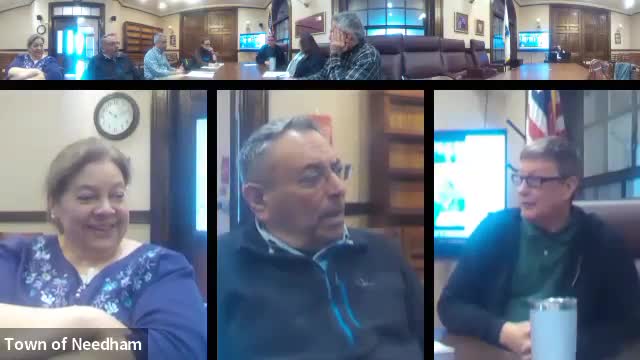Needham officials discuss tightening demolition-delay process, fix electronic permit 'red dot' flagging
Get AI-powered insights, summaries, and transcripts
Subscribe
Summary
The Needham Historical Commission and the Town of Needham building department met in a special session to discuss gaps in the town's demolition-delay process, missed historic-property flags in the electronic permitting system, and possible bylaw changes including an age-based threshold and a longer delay period.
Needham Historical Commission and Town building staff met in a special session to discuss gaps in the town’s demolition-delay process, missed historic-property flags in the electronic permitting system and possible bylaw changes.
Gloria Grace, chair of the Needham Historical Commission, opened the meeting by introducing the purpose: “Everybody, this is a special meeting of the Needham Historical Commission. I'm Gloria Grace, the chair, and we are meeting today with the building commissioner, Joe Prondec.”
The commission said the meeting mattered because the current six-month demolition-delay bylaw and the town’s electronic permitting setup sometimes fail to flag properties that may be historically significant, which can allow work to proceed without the commission’s review.
The bulk of the discussion focused on three operational problems and potential policy responses. First, Building Commissioner Joe Prondec described how property records appear in the electronic permitting system and identified a failure point: "The problem with that is so every every building in Needham has a a profile in, for lack of a better term, in the electronic programming system. If you click on just the profile, you'll see a red dot." Prondec said that when a permit application is viewed in isolation, the operator sometimes does not see that red-dot inventory marker and the historic-folder referral can be missed.
Second, the commission discussed possible bylaw changes intended to improve preservation outcomes. Jeff Heller, a long-time commission member, described experience in other communities and the limits of short delays: "When I first I remember when I first started in Newnan in 'six, the demolition delay was 9 months." Commissioners noted Milton increased its delay and moved from a date-based criterion to an age threshold; one participant said Milton later set a rule tied to properties older than 75 years. The commission discussed options including extending Needham’s six‑month delay, adopting an age-based trigger (for example 75 or 100 years), and adding a two-tiered administrative review (a lighter review for 75–100-year properties and a full review for older houses).
Third, staff and commissioners raised improvements to intake and outreach. Prondec said the building department will pursue better electronic workflows and automation so front-counter staff see inventory markers during permit intake and do not rely solely on manual file lookups. Commissioners asked the town to restore an interactive inventory map or spreadsheet on the town website and to add clear website guidance prompting homeowners and contractors to consult the Historic Commission early in planning.
Participants discussed the state energy-code changes adopted Feb. 14 and how they affect renovation decisions. Commissioners said recent code revisions (reducing certain HERS-rating triggers and excluding some basement/attic work from whole-house calculations) make some renovations more feasible without full-code retrofit waivers. The group also raised the need to clarify whether an energy-code waiver for historic properties requires an official listing on a federal/state/local register or can be granted by a building official on a case-by-case basis; Prondec said he would double-check the regulation’s final language.
Officials shared several data points during the meeting: the building department processes roughly 1,800 permits annually, and recent years saw about 60–90 demolitions a year, figures the commission and building staff said should inform any policy change. Commissioners asked staff to query the assessors’ database and the electronic-permit records to estimate how many 75+ or 100+ year houses come through the permit workflow each year and how many are on the historic inventory.
The commission and building staff agreed on interim procedural steps: (1) building staff will pursue an automated flag or workflow in the electronic permitting system so applications for inventory properties route automatically to the Historic Commission; (2) the commission will restore or republish an interactive inventory map or the assessors’ year-built spreadsheet on the town website; (3) the groups will canvass peer towns (for example, Milton) about bylaw language and implementation experience; and (4) Prondec will confirm the energy-code waiver language and report back. None of those steps were enacted as formal policy changes during the meeting.
There was one formal vote at the end of the meeting to adjourn. A motion to adjourn passed on a voice/roll call: Lowell – aye; Megan – yes; Joe – yes; Marshall – aye; Chair Gloria Grace – yes.
The commission said it will continue the review and seek select-board and town-meeting support for any bylaw amendments, noting that raising a demolition delay or moving to an age-based criterion would likely require coordinated outreach to voters and other town departments.
